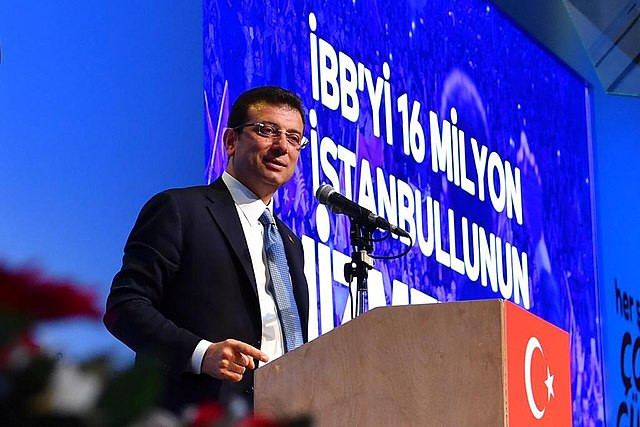Turkish police on Wednesday arrested Istanbul Mayor Ekrem Imamoglu, a leading opposition figure and key political rival to President Recep Tayyip Erdogan, in a sweeping crackdown that has triggered protests, raised international alarm, and rattled financial markets. Authorities also detained around 100 other individuals, including district mayors, journalists, and businesspeople, amid allegations of corruption and terror links.
The arrests come days before Imamoglu was widely expected to be confirmed as the Republican People's Party (CHP) candidate in future presidential elections. Prosecutors accused the mayor of financial misconduct and of aiding the outlawed Kurdistan Workers' Party (PKK), which Turkey, the U.S., and the EU classify as a terrorist organization.
State-run Anadolu Agency reported that police conducted early-morning raids, including one at Imamoglu's residence in Istanbul. His wife, Dilek Imamoglu, confirmed that officers arrived before dawn and took her husband away at approximately 7:30 a.m. Authorities also imposed a four-day ban on demonstrations in Istanbul and closed several roads, apparently to stifle public dissent.
"We are facing great tyranny, but I want you to know that I will not be discouraged," Imamoglu said in a video posted to social media. He later added in English, "I stand resolute, entrusting myself not only to the 16 million residents of Istanbul but to the 86 million citizens of Turkey."
The arrests have drawn swift condemnation domestically and internationally. Germany's Foreign Ministry labeled the detentions a "serious setback for democracy," while France expressed "deep concern" over the implications for Turkish democratic institutions. Amnesty International called the crackdown an "alarming intensification" of the Erdogan administration's targeting of opposition voices.
Protests erupted across Turkey in response. Hundreds gathered outside Istanbul's police headquarters and CHP offices, chanting slogans and waving banners bearing Imamoglu's image. Demonstrations also broke out on university campuses and in metro stations, with reports of police deploying pepper spray to disperse crowds. UK-based internet watchdog NetBlocks confirmed that access to social media platforms like X, YouTube, and Instagram had been severely restricted across Turkey.
Justice Minister Yilmaz Tunc rejected accusations of political interference, insisting, "Linking investigations and cases initiated by the judiciary to our President is, at best, presumptuous and inappropriate." Erdogan's ruling Justice and Development Party similarly denied any connection between the arrests and the presidency, emphasizing the independence of Turkey's judiciary.
The Istanbul Stock Exchange reacted sharply, with its main index plunging 7%, triggering a temporary trading halt. The Turkish lira also slid, briefly losing 7% of its value against the U.S. dollar as investors reacted to the political upheaval and growing concerns over democratic backsliding.
In an additional blow to Imamoglu's political prospects, Istanbul University on Tuesday annulled his diploma, citing irregularities in his transfer from a university in northern Cyprus in 1990. Under Turkish law, a university degree is a prerequisite for running in presidential elections. Imamoglu vowed to challenge the decision, calling it "legally baseless" and asserting that universities "must remain independent, free from political interference, and dedicated to knowledge."
Imamoglu's arrest comes against the backdrop of increasing government pressure on opposition leaders, journalists, and municipalities. His party, CHP, labeled the crackdown as "a coup against our next president." Tulay Hatimogullari, co-chairwoman of the pro-Kurdish Peoples' Equality and Democracy Party, called the operation "a disgrace that will not be forgotten for centuries."
Murat Ongun, Imamoglu's close aide, was also detained. Before his arrest, he posted on X, "I entrust Ekrem Imamoglu to the Turkish nation. Protect, watch over, and support him. They cannot defeat the nation."
Imamoglu, who has faced multiple lawsuits since assuming office, was elected Istanbul's mayor in March 2019, ending a 25-year reign by Erdogan's party over Turkey's largest city. His victory marked a historic shift in the country's political landscape and was reaffirmed in local elections last year, where his party made significant gains nationwide.
In addition to Wednesday's arrest, Imamoglu is appealing a 2022 conviction for allegedly insulting Turkey's Supreme Electoral Council-a case that, if upheld, could result in a political ban. Other ongoing cases involve accusations of tender irregularities during his tenure as district mayor and criticism of a public prosecutor.




